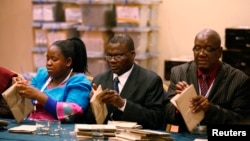HARARE —
Zimbabweans woke up Friday with the option of watching a new independent television station, broadcasting by satellite from South Africa. The new station was launched less than two weeks before the country's general elections, a development that the party of President Robert Mugabe is not happy about.
The Johannesburg-based station operates on a free-to-air satellite platform, which means it can be viewed by anyone in Zimbabwe with a satellite dish and a decoder.
Andrew Chadwick, the executive producer of 1st TV, says the new kid on the block aims to reach at least three million viewers plus, which is about a quarter of Zimbabwe’s population.
According to Chadwich the purpose of 1st TV is to serve the Zimbabwean people. “1st TV is designed to meet the demands of the Zimbabwean people for a television station which they have failed to be allowed to view for the past three years,” he stated.
Zimbabwe has one of the toughest broadcasting laws in the world. Until last year, the state-owned Zimbabwe Broadcasting Corporation, which openly favors President Mugabe and his ZANU-PF party, had a monopoly of the airwaves.
There are now two privately radio stations in Zimbabwe, but both have ties to ZANU-PF.
Chadwick said 1st TV will be offering "unbiased" coverage of both ZANU-PF and its main opponent in the July 31 elections, the Movement for Democratic Change party, or MDC. nHe said the approval of both parties is critical for advertising.
The elections are expected to end the power-sharing government that ZANU-PF and MDC have operated, with friction, since 2009.
The ZANU-PF side of the government said 1st TV is a Western- sponsored project, meant to discredit President Mugabe and the party ahead of the elections.
But Tendai Biti, Zimbabwe’s finance minister and a member of the MDC, has a different view. "To ZANU-PF everything is a pirate except them. The media should be opened up. The fact that 33 years after independence we have one broadcasting house is criminal," he said. "The fact that 33 years after independence we have a paper called a state newspaper, it does not happen anywhere [else] in the world," he said.
ZANU-PF and MDC will lock horns in the elections for president, parliament and other offices, now less than two weeks away.
The polls got off to a bad start this week, when a scheduled two days of voting by security forces was extended to three amid reports of disorganization, and over the objections of the MDC.
Finance Minister Biti said last week the cash-strapped government still needs at least $85 million to pay for the elections. Biti has since located some funds, but the treasury remains far short of its goal.
The Johannesburg-based station operates on a free-to-air satellite platform, which means it can be viewed by anyone in Zimbabwe with a satellite dish and a decoder.
Andrew Chadwick, the executive producer of 1st TV, says the new kid on the block aims to reach at least three million viewers plus, which is about a quarter of Zimbabwe’s population.
According to Chadwich the purpose of 1st TV is to serve the Zimbabwean people. “1st TV is designed to meet the demands of the Zimbabwean people for a television station which they have failed to be allowed to view for the past three years,” he stated.
Zimbabwe has one of the toughest broadcasting laws in the world. Until last year, the state-owned Zimbabwe Broadcasting Corporation, which openly favors President Mugabe and his ZANU-PF party, had a monopoly of the airwaves.
There are now two privately radio stations in Zimbabwe, but both have ties to ZANU-PF.
Chadwick said 1st TV will be offering "unbiased" coverage of both ZANU-PF and its main opponent in the July 31 elections, the Movement for Democratic Change party, or MDC. nHe said the approval of both parties is critical for advertising.
The elections are expected to end the power-sharing government that ZANU-PF and MDC have operated, with friction, since 2009.
The ZANU-PF side of the government said 1st TV is a Western- sponsored project, meant to discredit President Mugabe and the party ahead of the elections.
But Tendai Biti, Zimbabwe’s finance minister and a member of the MDC, has a different view. "To ZANU-PF everything is a pirate except them. The media should be opened up. The fact that 33 years after independence we have one broadcasting house is criminal," he said. "The fact that 33 years after independence we have a paper called a state newspaper, it does not happen anywhere [else] in the world," he said.
ZANU-PF and MDC will lock horns in the elections for president, parliament and other offices, now less than two weeks away.
The polls got off to a bad start this week, when a scheduled two days of voting by security forces was extended to three amid reports of disorganization, and over the objections of the MDC.
Finance Minister Biti said last week the cash-strapped government still needs at least $85 million to pay for the elections. Biti has since located some funds, but the treasury remains far short of its goal.




